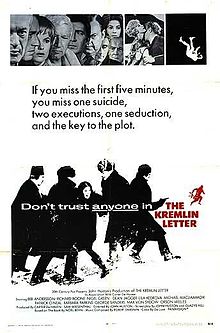
THE KREMLIN LETTER
US, 1969, 121 minutes, Colour.
Richard Boone, Bibi Andersson, Max von Sydow, Patrick O' Neal, Orson Welles, Nigel Green, Dean Jagger, Lila Kedrova, Barbara Parkins, George Sanders, Michael Mac Liammoir.
Directed by John Huston.
The Kremlin Letter was released in 1970. The 60's had seen the heyday of the James Bond films and the many imitations, many of which were quite successful. The disillusionment spy films had come in the late 60s after The Spy Who Came in From The Cold. By 1970 the spy films were lessening and those released were more ironical showing the sordid and conscience-destroying aspects of the profession. This film is a case in point, not relaxing entertainment, but complicated, well acted and bitterly cynical about spy ruthlessness. Despite John Huston's reputation, reviewers generally dismissed the film. It was interesting to note that in America, the National Catholic Office gave it feature review space in its Newsletter, stating that many spy films give the impression that spying is sordid, but that they are surprised to discover this. This film is not surprised and effectively shows spy ugliness.
1. What was the overall impact of this film? Interest or enjoyment, fascination by espionage intrigue? Was it a good spy film?
2. How characteristic a film of 1970 was this? The reaction against spectacular espionage? The grim and sordid details of espionage work? Was this well communicated, realistically? The atmosphere and its ugliness, cruelty?
3. Why do audiences like espionage films? Why are they so interesting? How real or fantasy-like do they seem? The structure of espionage films? The details of the mission. the executing of the mission. the twists because of deceit, the irony of the traps at the end? Comment on the complication of the plot and how well they were worked out in this film?
4. What did the film have to say about the type of person involved in espionage? Their motivations, their world view, capacity for deceit and cruelty, involvement in an ugly world, amoral standards? How was this illustrated in the main characters? What did film have to say about the necessity of spying? That in war and in peace time it is necessary to find out what the enemy is doing? The necessity of danger? The type of personality that responds to this necessity?
6. How important is personal ambition in motivating spies? How was this illustrated with Bresnavich, with Kosnov and with Ward? The ironies of the clash of ambitions, the using of the rival's weakness for trapping others?
7. The theme of manipulation in espionage? The using of people, cruelty in manipulation?
8. Can there be an innocent spy? Can people become involved in this work through innocence? Can they live through it innocently?
9. How was Rone the hero of the film? The initial impression as he left the navy? His see-king out his fellow workers? The nature of the mission and his dedication? The fact that the mission was doomed from the start? The way that he used and tricked people? His emotional response, especially to Erika? The final trap at the end? Was there sympathy for Rone at the end?
10. What insight into the type of character portrayed in Ward? Ambitions. double agents, personal style, cruelty and manipulation?
11. The American overtones of the espionage? The comment on Russia?
12. The character of Erika and the complications? What kind of person in herself: the way that she was used for espionage purposes, the love of Kosnov and his being manipulated unwittingly by her, Rone and his involvement with Erika?
13. BA and audience response to a girl? Her relationship to her father, her professional skill in safe breaking, the lesbian overtones, the relationship with Rone, her being kept for death?
14. Comment on the other members of the team and their personalities, motivations for belong; the whore, warlock, the Highwayman, Sweet Alice?
15. What insight into the background of international politics and war did the film give?
16. The insight into justice and injustice, means and ends?
17. Comment on the pessimistic outlook of the whole film.